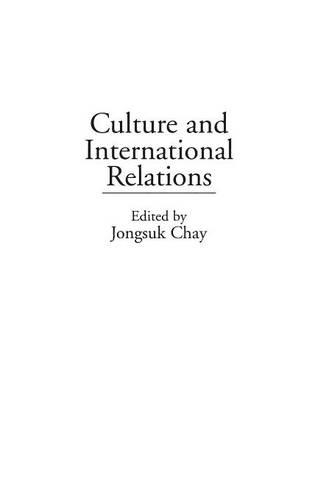
Culture and International Relations
(Hardback)
Publishing Details
Culture and International Relations
By (Author) Jongsuk Chay
Bloomsbury Publishing PLC
Praeger Publishers Inc
19th January 1990
United States
Classifications
Tertiary Education
Non Fiction
Political science and theory
327.101
Physical Properties
Hardback
308
Description
Meeting a major challenge, twenty-four scholars collaborated to produce this unprecedented volume on the cultural dimensions of international relations. This field of study, long considered too vast, has up to now been neglected by scholars in the humanities and international relations. This 18-chapter book provides a theoretical overview, examines the present status of scholarship where international relations and the humanities intersect, and studies the impact of cultural differences in shaping foreign policy. U.S. international political culture receives special attention. Other cultures given close examination include Africa, Asia, Latin America, and the Middle East. The book concludes with a discussion of the key issues in culture and international relations. The importance of culture in international relations has long been recognized yet neglected. This volume fills this void of scholarship. It has three objectives: to survey studies completed to date; to determine the impact of cultural differences upon the foreign policy making process; and, most importantly, to push forward the frontiers of knowledge in this field.
Reviews
The study of the relationship between culture and politics--and by inference between culture and international relations--comes from the European sociology tradition and has best emerged in The Civic Culture Revisited, under the general editorship of Gabriel A. Almond and Sidney Verba (1989). The theme has been more concisely analyzed in Walter A. Rosenbaum's Political Culture (1975). There is an attempt here to treat the raw notion of culture itself as a defining principle of international relations. Chay has segmented the study into five parts: Part 1 attempts to set out a general understanding of the concept with little specificity and obviously little agreement among the other contributors. Part 2 looks at the relationship from the perspective of the humanities, in particular an anthropological treatment of warfare, war and peace in literature, international relations in music, and the topics handled by philosophy. Another section is completely devoted to cultural aspects of US foreign policy. The last two parts look at geographical regions and issue areas. Given that so little attention has been paid to the importance of culture in explaining international group relations within the context of the international political system, this book is a worthwhile contribution. A good addition to a basic international relations collection for upper-division undergraduates and above.-Choice
"The study of the relationship between culture and politics--and by inference between culture and international relations--comes from the European sociology tradition and has best emerged in The Civic Culture Revisited, under the general editorship of Gabriel A. Almond and Sidney Verba (1989). The theme has been more concisely analyzed in Walter A. Rosenbaum's Political Culture (1975). There is an attempt here to treat the raw notion of culture itself as a defining principle of international relations. Chay has segmented the study into five parts: Part 1 attempts to set out a general understanding of the concept with little specificity and obviously little agreement among the other contributors. Part 2 looks at the relationship from the perspective of the humanities, in particular an anthropological treatment of warfare, war and peace in literature, international relations in music, and the topics handled by philosophy. Another section is completely devoted to cultural aspects of US foreign policy. The last two parts look at geographical regions and issue areas. Given that so little attention has been paid to the importance of culture in explaining international group relations within the context of the international political system, this book is a worthwhile contribution. A good addition to a basic international relations collection for upper-division undergraduates and above."-Choice
Author Bio
JONGSUK CHAY is a Professor of History at Pembroke State University. He is the editor or coeditor of Problems and Prospects of American-East Asian Relations (1987), U.S.-Korean Relations, 1882-1982 (1982), and The Buffer States in World Politics (1987) and the author of A Symmetrical Diplomacy: Korean-American Relation to 1910(1990) and a number of scholarly articles and chapters on American-East Asian Relations, American foreign policy, and international relations.
